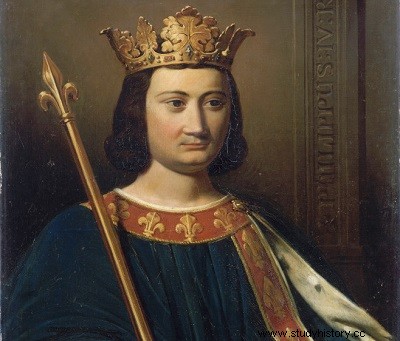
(Fontainebleau, 1268 - 1314.) King of France (1285-1314), son of Philip III the Bold and Isabella of Aragon. Philippe le Bel, secret and controversial king, takes place among the sovereigns who worked tirelessly for the greatness of France.
When his father dies in the castle of the King of Majorca, in Perpignan, Philippe is 17 years old. Handsome – he is nicknamed the “beautiful king” – with a strength that astonishes those who approach him, the young king has only one passion, apart from the affairs of the kingdom, hunting. Pious, despite his problems with the Church, prudish, Philippe will love only one woman, his own, Jeanne de Navarre, married in 1284. We will see him expelling from his court all the women whose presence he deems useless.
Jeanne gave him three sons, Louis, Philippe and Charles, and three daughters, only one of whom, Isabelle, would reach adulthood. The princes fear their father, who treats them rather harshly. Louis, the eldest, is silenced in the Council.
Many of his contemporaries describe him as humble, gentle, accepting suggestions and advice from those around him. The bishop of Pamiers Bernard Saisset, an enemy of the king, it is true, said of him:“He is neither a man nor an animal, he is a statue. Now Philippe le Bel is considered today as one of the greatest kings of France, demanding for himself as for others, concerned only with the good and the greatness of the kingdom. Some consider him a tyrant.
The king, parsimonious for himself, spent lavishly to enhance the brilliance of the court or the monarchy, through constructions and plenary courts, in particular. If he willingly resides in Fontainebleau, where he was born and will want to die, if many of his decisions are born in the retirement of the abbey of Maubuisson, Philippe undertakes considerable work at the Palais de la Cité, in Paris.
Most of the buildings, except the Sainte-Chapelle, were rebuilt at the beginning of the 14th century. The new construction will be the main residence of the king and his family at the end of the reign.
A clever politician, Philippe IV knew how to surround himself with competent advisers. Those called lawyers, men of minor nobility or bourgeois, often officers of justice or finance before joining the entourage of the king, were generally trained in Roman law. They derive from it the idea, both ancient and modern, contrary to feudalism, that the State is an independent and inalienable power. A conception which is also opposed to the idea of a pontifical theocracy defended by the popes of the 13th century, then by Boniface VIII. These advisers take an oath to the king, written by Philip himself, in which they promise loyalty to him and to his eldest son. Among the best known are Pierre Flotte, holder of the seals until his death at the battle of Courtrai in 1302. Guillaume de Nogaret, who succeeded him, was to be one of the king's most zealous servants, in the pope's business as in that of the Templars*. Enguerrand de Marigny, of modest birth, began his career as secretary to the king's chamberlain, Bouville, before holding the highest positions in his hands. Almighty, with Nogaret, after the death of Pierre Flotte, greedy, hard, he participated in all the financial and fiscal operations of the early fourteenth century, attracting, with the enmity and envy of the nobles, the hatred of the people. Pierre de Latilly, Michel de Bordenai, Raoul de Presle are also among the lawyers.
